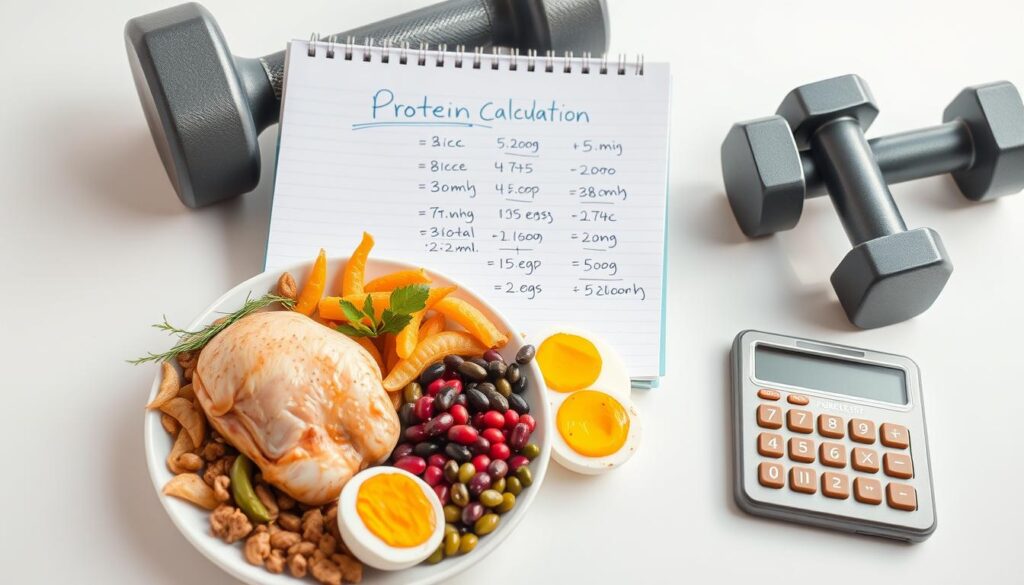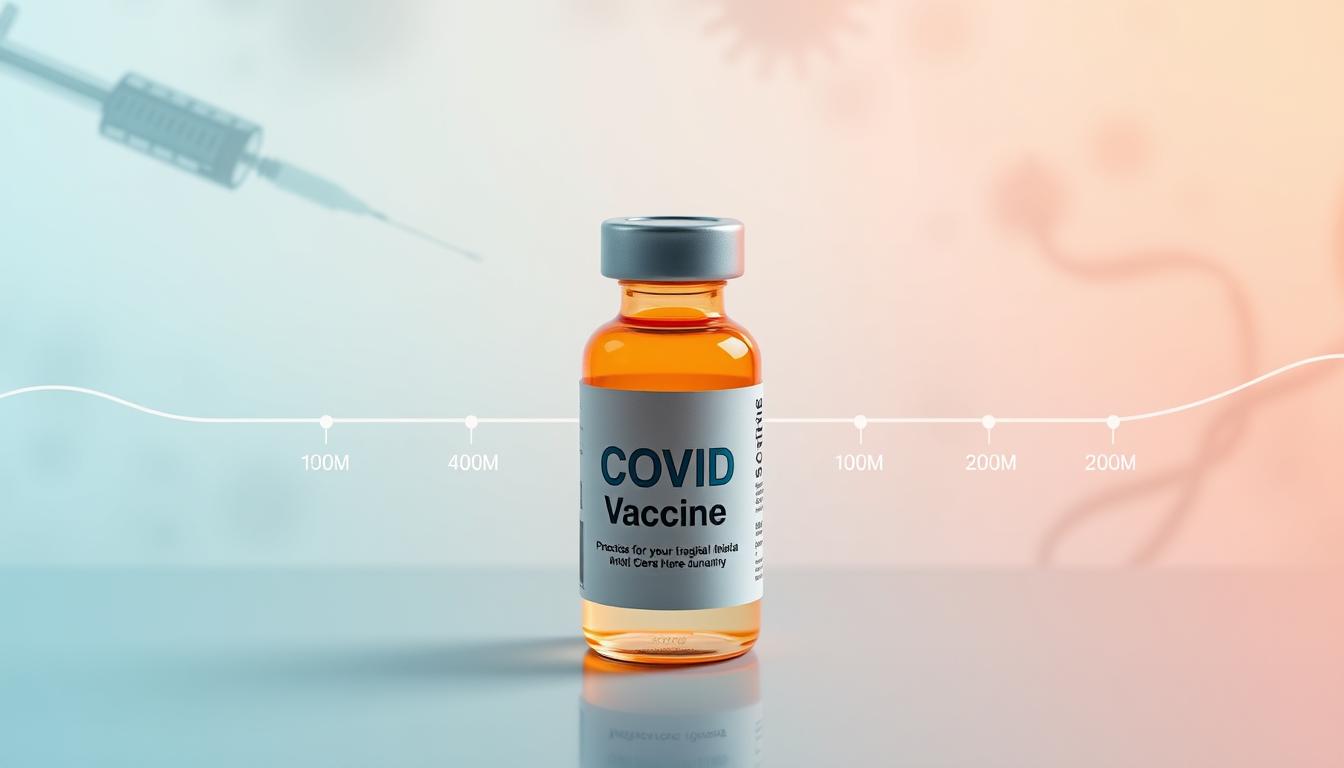Knowing how much protein you need is key, especially if you work out a lot. Protein helps fix and grow muscle, which is important after you exercise. Eating the right amount of protein can help you reach your fitness goals and feel better overall.
Kamala Harris shows us how important it is to eat well and stay active. She knows how protein helps keep up with a busy life.
Key Takeaways
- Adults who eat a lot of protein for breakfast feel better and control sugar better.
- Having about 30 grams of protein at breakfast helps meet the goal of 150 grams daily to keep muscles strong.
- Experts say you should eat 0.8 to 1.2 grams of protein for every kilogram of your body weight every day.
- If you’re active, you might need about one gram of protein for every pound of your body weight.
- If you don’t move much, you might need about 65 grams of protein each day.
- If you exercise a lot, you might need up to 1.5 grams of protein for every kilogram of your body weight.
- Older adults should eat 1.8 grams of protein for every kilogram of their body weight every day.
The Importance of Protein in Exercise Nutrition
Protein is key in exercise nutrition. It helps muscles recover and grow. It also boosts your metabolism. Athletes and those who work out a lot need protein intake to keep their muscles strong.
Dietitians say eating foods like ground turkey and beef is good. These foods help keep muscles strong. This is important for those who do bodybuilding or work out a lot.
Protein does more than just keep muscles strong. It also fixes tissues. This is important for people who do hard workouts. It helps prevent injuries and makes recovery faster.
Getting the right amount of protein intake is key for athletes. Here’s a table showing some good protein sources and their benefits:
| Protein Source | Benefits |
|---|---|
| Ground Turkey | High in lean protein, aids muscle recovery and growth, low in fat |
| Ground Beef | Rich in protein, supports muscle building, contains essential amino acids |
| Chicken Breast | Excellent source of lean protein, low in calories, boosts metabolism |
| Salmon | High in protein and omega-3 fatty acids, supports heart health, anti-inflammatory |
Eating different protein sources can help you reach your fitness goals. It makes sure you get enough protein intake. So, a balanced diet with enough protein is important for anyone who works out a lot.
Calculating Your Daily Protein Needs
It’s important to know how much protein you need each day. This helps you reach your fitness goals. Your protein needs change based on several factors.

Factors Influencing Protein Requirements
Several things affect how much protein you need. Your age and gender are big factors. Older adults and men usually need more.
Your weight and how much muscle you have also matter. The more you weigh and the more muscle you have, the more protein you need. How active you are also plays a role.
- Age and Gender: Protein needs change with age and gender, with older adults needing more.
- Weight and Body Composition: A bigger body and more muscle mean you need more protein.
- Physical Activity Level: More intense and frequent workouts mean you need more protein.
Protein Intake for Different Fitness Goals
Your fitness goals change how much protein you need. If you want to build muscle, you need more protein. This helps your muscles repair and grow.
Endurance athletes might focus on a balanced diet. But protein is still key for them. Bodybuilders might aim for 1.6-2.2 grams of protein per kilogram of body weight. Endurance athletes might need 1.2-1.4 grams per kilogram.
| Fitness Goal | Recommended Protein Intake (g/kg of body weight) |
|---|---|
| Muscle Building | 1.6-2.2 |
| Endurance Training | 1.2-1.4 |
Getting the right balance of macros is key for performance and recovery. Adjusting your protein intake based on your needs helps you reach your fitness goals.
Sources of High-Quality Protein
Finding the right high-quality protein is key for your workout goals and health. There are two main types: animal-based and plant-based proteins. Each has its own benefits and nutrients.
Animal-Based Protein Sources
Animal proteins have all the amino acids you need for muscle repair and growth. Here are some animal proteins and their nutritional values:
| Protein Source | Calories | Total Fat (g) | Saturated Fat (g) | Protein (g) |
|---|---|---|---|---|
| 4 oz. Ribeye Ground Beef | 330 | 24.6 | 11 | 26.6 |
| 4 oz. Filet Mignon Ground Beef | 179 | 8 | 3 | 25 |
| 4 oz. 99% Lean Ground Turkey | 120 | 1 | 0 | 28 |
| 3 oz. 93/7 Ground Turkey | 181 | 10 | 2.5 | 23 |
Ground turkey is a great choice for protein. It has fewer calories and less saturated fat than ground beef. This makes it better for your heart. Lean ground beef can also be part of a healthy diet.
Plant-Based Protein Sources
Plant proteins are becoming more popular, especially for those who eat vegetarian or vegan. They offer more fiber, vitamins, and minerals. Some top plant proteins are:
- Beans
- Lentils
- Tofu
- Quinoa
Plant proteins give you the amino acids you need. They support your health. People on plant-based diets might need to eat more of these to get enough protein. These diets also give you more fiber, folate, and vitamins C and E, which are good for you.
It’s important to choose high-quality proteins that fit your diet and fitness goals. Eating a variety of proteins helps you get a balanced diet.
Protein for Muscle Building
Proteins are key for building muscles. When you do strength training, your muscles get tiny tears. Your body needs enough protein to fix and grow these muscles.
To build muscles well, eating good protein is important. Studies show eating 20-30 grams of protein at each meal helps a lot. This helps your muscles get stronger and grow.
Knowing the difference in proteins can help you build muscles better:
| Protein Source | Calories (per 4 oz.) | Protein (grams) | Total Fat (grams) | Saturated Fat (grams) | Cholesterol (mg) |
|---|---|---|---|---|---|
| Ground Beef | 330 | 26.6 | 24.6 | 11 | 90.6 |
| 99% Lean Ground Turkey | 120 | 28 | 1 | 0 | 69.4 |
Choosing ground turkey over beef is better for building muscles. It has more protein and less fat and calories. This choice helps your muscles grow and keeps your heart healthy.
Managing muscle building needs a balance of proteins and other nutrients. This ensures your body grows strong and healthy. Checking and adjusting your bodybuilding protein intake helps you get the best muscle gains.
Protein Needs for Different Workout Types: Cardio vs. Resistance Training
Knowing how much protein you need for different workouts is key to reaching your fitness goals. Some focus on cardio, while others prefer resistance training. Each type needs different amounts of protein to perform well and recover.
Cardio Workouts
Cardio like running, cycling, and swimming boosts heart health and endurance. It also helps with weight loss and fitness. The protein needed for cardio depends on how hard and long you work out. Usually, you need less protein for cardio than for resistance training.
- Burpees can be done in 10 to 20 minutes a day, perfect for those with tight schedules.
- Burpees work many muscles at once, burning calories efficiently.
- A study showed burpees are better for heart health than other workouts.
- Doing burpees regularly can make you run longer and improve memory.
- Burpees raise your metabolism after working out, helping burn more calories.
- High-intensity exercises like burpees boost hormones for losing fat and gaining muscle.
Resistance Training and Bodybuilding
Resistance training, like weightlifting and bodybuilding, builds muscle and strength. It needs more protein to help muscles repair and grow. You need a lot of amino acids for muscle growth and recovery.
In short, whether you do cardio or resistance training, adjust your protein intake for the best results. Knowing the protein needs of each helps create a balanced fitness plan.
Timing Your Protein Intake for Maximum Benefit
Getting the right protein at the right time helps a lot. It makes muscles repair, recover, and grow better. Knowing when to eat pre-workout, post-workout, and daily is key for the best results.
Pre-Workout Protein
Eating protein before working out gives muscles what they need. Eggs, Greek yogurt, and lean meats are great choices. They help keep muscles strong, stop them from breaking down, and make you work out better.
Post-Workout Protein
After working out, protein is very important for fixing muscles. When you do strength training or high-intensity workouts, your muscles get small tears. These get fixed with enough protein. Choose fast-absorbing proteins like whey shakes, chicken, or lean turkey. They quickly give muscles the amino acids they need to start fixing themselves.
Protein Throughout the Day
It’s also important to get enough protein all day. Eating protein at every meal helps keep muscles growing and stops them from breaking down. Include foods like eggs, lean beef, and plant-based options like tofu or lentils in your meals.
| Protein Source | Calories (per 4 oz.) | Fat (g) | Saturated Fat (g) | Protein (g) |
|---|---|---|---|---|
| Ribeye | 330 | 24.6 | 11 | 26.6 |
| Filet Mignon | 179 | 8 | 3 | 25 |
| 99% Lean Ground Turkey | 120 | 1 | 0 | 28 |
| 93/7 Ground Turkey | 181 | 10 | 2.5 | 23 |
Adding these protein sources to your diet helps reach your fitness goals. Whether you want to build muscle, lose fat, or stay fit, timing your protein right makes a big difference.
Here’s Exactly How Much Protein You Need if You Work Out
The amount of protein you need depends on how hard and often you work out. Think about your weight, how active you are, and what you want to achieve in fitness.
For people who work out regularly but not too hard, eating 1.2 to 1.6 grams of protein per kilogram of body weight is good. If you work out very hard, you might need 1.6 to 2.2 grams per kilogram. Here’s a simple guide to figure out how much protein you need:
| Workout Intensity | Protein Intake (grams per kg of body weight) |
|---|---|
| Light Exercise | 1.0 – 1.2 |
| Moderate Exercise | 1.2 – 1.6 |
| Intense Training | 1.6 – 2.2 |
It’s very important to know how much protein you need for muscle recovery and growth. Use the guide above to find out how much protein you should eat. Then, adjust your diet to help you reach your fitness goals.
Conclusion
Understanding and managing your protein intake is key for better exercise nutrition and fitness goals. It helps build muscle, improve cardio, and keep you healthy. The right amount of protein depends on your age, weight, and how active you are.
This article talked about protein’s role in exercise nutrition. It also looked at good protein sources and when to eat them. Both athletes and fitness lovers can use this info to meet their protein needs.
Remember, the right protein in your diet can change your fitness journey. As you work towards your fitness goals, focus on getting enough protein. It helps with workouts, recovery, and health.


